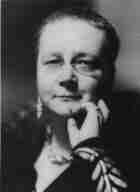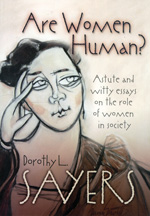Most of us, when we hear the term “feminist” think of aggressive females demanding their rights to be equal with men. The stereotype is one of women who think that to be equal with men, they must act like men, meaning authoritative, if not brash.
It is too bad that this is the image that comes to mind when we speak of feminism. It is too bad because the best men I have known are not loud-mouthed and tyrannical. Real men imitate the Lord Jesus Christ who was strong and authoritative, but not brash or pushy. Real women would do well to also look to Jesus for their example. Dorothy Sayers said it well, in her essay, “Are Women Human?” –
because the best men I have known are not loud-mouthed and tyrannical. Real men imitate the Lord Jesus Christ who was strong and authoritative, but not brash or pushy. Real women would do well to also look to Jesus for their example. Dorothy Sayers said it well, in her essay, “Are Women Human?” –
Perhaps it is no wonder that the women were first at the Cradle and last at the Cross. They had never known a man like this Man … A prophet and teacher who never nagged at them, never flattered or coaxed or patronized … who rebuked without querulousness and praised without condescension; who took their questions and arguments seriously; who never mapped out their sphere for them, never urged them to be feminine or jeered at them for being female … Nobody could possibly guess from the words and deeds of Jesus that there was anything [inferior] about woman’s nature.
The real problem is not in the differences between men and women; the real problem is that we wrongly categorize people, and then expect them to live in the box that we have created for them. Women calling themselves “feminists” today have decided that they want to be more as what they imagine men are like, and to them this must mean essentially different. This also means, as if by default, that men are somehow better. Feminists have determined that based on their “class” as men, men must necessarily act in certain ways. To be like men, women must copy them. This is one of the main objections of Dorothy L. Sayers to feminism – Men and women are not essentially different; they are merely fitted, in most cases, to be doing different work.
Dorothy Sayers moved around in a world of men. She was among the first women to be given an advanced degree by Oxford University. She counted other well-known male authors as her friends, among them C. S. Lewis. Most people remember Miss Sayers as the author of the delightful Lord Peter Wimsey series of mysteries. She was also a scholar, theologian, playwright, lecturer, and essayist. She was well respected and is still admired by many for her insightful works on theology. She was witty and intelligent and could get her point across in a friendly, straightforward way without being abrasive.
Dorothy was comfortable with her life in a male world, because she believed that “male” and “female” are adjectives that qualify the noun “human being”, and that all human beings are equal in their personhood. It is important to be a good and kind human being. She did not need to try and behave as the feminists of her day behaved, who tried to gain their points with battering rams instead of pens.
Dorothy Sayers lived the life that she was called to without apology. She practiced what she preached. She worked hard and she was well respected for that, not based on her gender, but on her ability. This is a point that she would make in her essays on feminism – men and women are not inherently different. She was respected as an author who happened to be a woman, not the other way around. This is an important point that the feminists, and chauvinists, miss.
 Because she spoke out against the unfair treatment of women, Dorothy Sayers has been seen as a feminist by many. Actually, she did not espouse the cause of the liberation movement because she believed that aggressive feminism would do more harm than good. She explained why she thought this in an address given to a Women’s Society meeting in 1938 entitled, “Are Women Human?”
Because she spoke out against the unfair treatment of women, Dorothy Sayers has been seen as a feminist by many. Actually, she did not espouse the cause of the liberation movement because she believed that aggressive feminism would do more harm than good. She explained why she thought this in an address given to a Women’s Society meeting in 1938 entitled, “Are Women Human?”
The question of ‘sex-equality’ is, like all questions affecting human relationships, delicate and complicated. It cannot be settled by loud slogans or hard-and fast assertions like ‘a woman is as good as a man’ – or ‘woman’s place is the home’ – or ‘women ought not to take men’s jobs.’ The minute one makes such assertions, one finds one has to qualify them. ‘A woman is as good as a man’ is as meaningless as to say, ‘a Kaffir is as good as a Frenchman’ or ‘a poet is as good as an engineer’ or ‘ an elephant is as good as a racehorse’ – it means nothing whatever until you add: ‘at doing what?” In a religious sense, no doubt, the Kaffir is as valuable in the eyes of God as a Frenchman – but the average Kaffir is probably less skilled in literary criticism than the average Frenchman, and the average Frenchman less skilled than the average Kaffir in tracing the spoor of big game.
And the point is, not that every woman is, in virtue of her sex, as strong, clever, artistic, level-headed, industrious and so forth as any man that can be mentioned; but, that a woman is just as much an ordinary human being as a man, with the same individual preferences, and with just as much right to the tastes and preferences of an individual. What is repugnant to every human being is to be reckoned always as a member of a class and not as an individual person.
In other words, it is wrong to assume that an individual’s tastes and preferences are determined by the class to which one belongs. This is the error into which many, including well-meaning people in our churches, are inclined to fall. And because of this mistake, the antagonism between the sexes is exacerbated. We must learn to see, as Dorothy Sayers did, that men and women are the same in their fundamental being, but designed by God for different tasks. In our day, most so-called feminists reject God our Creator. They will not accept that we are creatures made in the image of God for a special purpose. This is another reason why we may not lump Dorothy Sayers into the liberal feminist group. She believed very much in a Creator and that we are created for a purpose. In her work, The Mind of the Maker, she explains that we as human beings reflect the image of God best when we are being creative as God was creative. This creativity is not just for “artists,” but for everyone. When we are creative in our work, whether as builders, managers, teachers, homemakers, or whatever, we most closely resemble our Creator.
This brings me to my next point – Dorothy Sayers’ position on women is based on a strong, coherent world view. In all of her writings her beliefs about mankind, the world, and God are clearly evident. Men and women are created to perform their special functions in the world. There is mystery involved in how God created humankind “male and female.” Nevertheless, we are all equal in our creature-hood. We have different functions, or work, to perform. We all, male or female, must find out what God has fitted us for and be faithful to our tasks. In God’s eyes no one’s work makes him or her a superior human being to other people. We will all stand before Him alone and give an account of our lives to Him.
I am thankful that Dorothy Sayers was faithful to her calling. She has left us a legacy of wonderful works. Whether reading the popular Lord Peter Wimsey mysteries, or the religious plays, theological works, or essays on life, one can appreciate her wit and penetrating interpretation of life. There is depth in her writing on the treatment of women which far surpasses most feminist authors. We need this today. Her essays are non-offensive, even humorous, and I highly recommend them.
“Are Women Human?”
“The Human-Not-Quite-Human”
See also:
“Why Work?”
“The Other Six Deadly Sins” in Creed or Chaos?
The Mind of the Maker

